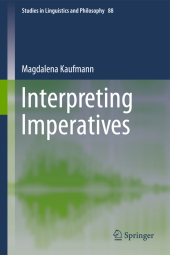 Neuerscheinungen 2013Stand: 2020-01-07 |
Schnellsuche
ISBN/Stichwort/Autor
|
Herderstraße 10
10625 Berlin
Tel.: 030 315 714 16
Fax 030 315 714 14
info@buchspektrum.de |

Magdalena Kaufmann
Interpreting Imperatives
2012. 2013. xii, 272 S. 15 SW-Abb., XI, 269p. 15 illus.. 235 mm
Verlag/Jahr: SPRINGER NETHERLANDS; SPRINGER, BERLIN 2013
ISBN: 9400737572 (9400737572)
Neue ISBN: 978-9400737570 (9789400737570)
Preis und Lieferzeit: Bitte klicken
This book offers new perspective on imperative clauses in the study of meaning. Analyzes imperatives in terms of modalized propositions and identifies an additional, presuppositional, meaning component that makes an assertive interpretation inappropriate.
Imperative clauses are recognized as one of the major clause types alongside those known as declarative and interrogative. Nevertheless, they are still an enigma in the study of meaning, which relies largely on either the concept of truth conditions or the concept of information growth-neither of which are easily applied to imperatives. This book puts forward a fresh perspective. It analyzes imperatives in terms of modalized propositions, and identifies an additional, presuppositional, meaning component that makes an assertive interpretation inappropriate. The author shows how these two elements can help explain the varied effects imperatives have, depending on their usage context.
Imperatives have been viewed as elusive components of language because they have a range of functions that makes them difficult to unify theoretically. This fresh view of the semantics-pragmatics interface allows for a uniform semantic analysis while accounting for the pragmatic versatility of imperatives.
From the reviews:
"This book provides an analysis of imperatives that aims to unify the study of their linguistic form with that of their various potential uses. ... A benefit of this book is that linguists of different areas may find it useful. Because it includes in-depth syntactic analyses of imperatives, as well as semantic and pragmatic ones, different chapters target different audiences. Most linguists interested in imperatives would likely find the whole book helpful ... ." (Mary Johnson, The Linguist List, February, 2013)


